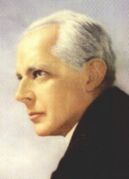
Béla Bartók (March 25, 1881 – September 26, 1945) was a Hungarian composer and pianist as well as one of the founders of comparative musicology and is considered one of the most important composers of the 20th century. He gave his first public performance at 11 in Nagyszőlősand and also played his own first composition, written when he was 9, a short piece called "The Course of the Danube". He started studying at the Royal Academy of Music in Budapest in 1899 and graduated in 1903. Initially his compositions were influenced by Wagner, Brahms, Liszt and Strauss, blending late Romanticism and nationalist elements, like in Kossuth. His style changed around 1905 and became much more concentrated, chromatic and dissonant when Zoltán Kodály directed his attention to Hungarian folk music. This style is what made him really famous. He moved to the USA with his second wife (Ditta Pásztory) when the Second World War broke out and had to face considerable financial difficulties because his concert engagements became much rarer. He died of a form of leukemia on September 26, 1945. He was still able to complete his Third Piano Concerto and sketch out a Viola Concerto just before his death. He is believed to have had Asperger's Syndrome and is featured in The Genesis of Artistic Creativity by Michael Fitzgerald, Asperger’s and Self-Esteem:Insight and Hope through Famous Role Models by Norm Ledgin, A Guide to Asperger Syndrome by Christopher Gillberg as well as in Asperger Syndrome and High Achievement by Ioan James. Read more about this extraordinary musician, his life and his work on his Wikipedia page or here (shorter).